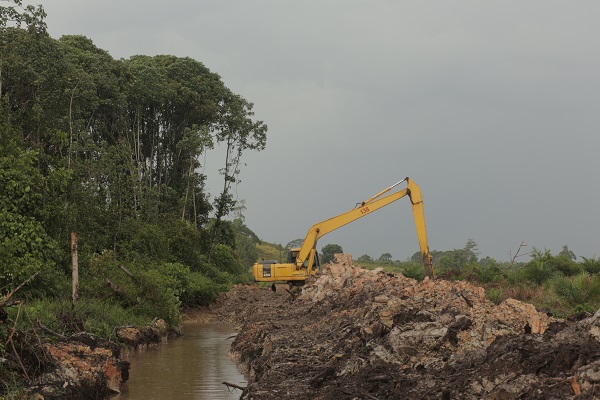- Blog
- Sustainable Economic Systems
- Lets prevent palm oil from foreclosing on our climate future
Lets prevent palm oil from foreclosing on our climate future

Donate Now!
Your contribution will benefit Friends of the Earth.
Stay Informed
Thanks for your interest in Friends of the Earth. You can find information about us and get in touch the following ways:
When we think about the causes of climate change, we tend to focus on energy generation and carbon emissions from fossil fuels; consequently, a lot of activity to curb climate disruption, such as 350.org’s Fossil Fuel Divestment campaign and Friends of the Earth’s own climate and energy work, addresses our urgent need to power down and break our fossil fuel addiction.
This is absolutely right.
But we shouldn’t forget that agriculture and land use change are next in line as major causes of greenhouse gas emissions: if we want to curb runaway climate change, we need to change our agricultural system. We should also remember that deforestation, especially tropical deforestation, is responsible for some 10-15 percent of global greenhouse gas emissions – more than the emissions from all the cars, trucks, trains and buses in the world each year combined. If we want to curb runaway climate change, we need to end the widespread destruction of forests, which is caused largely by, again, industrial agriculture.
This is where palm oil comes in. A perfect storm of deforestation on a vast scale, industrial agricultural excess, degradation of carbon-rich peatlands, human rights abuse, and labor exploitation, the palm oil industry can take significant credit for its current and future contribution to the climate crisis.
That’s why it’s so important to recognize, as we did in this recent blog, that the palm oil industry is not driven so much by consumer demand as it is by the need of financial markets for commodities that provide high returns.
This is also why it’s so noteworthy that Wilmar International, the largest palm oil trader in the world, and the main corporate target of our Landgrabs, Forests and Finance campaign, recently announced a new “No Deforestation, No Peat, No Exploitation Policy.”
The policy, which comes as a response to years of pressure from civil society, has the potential to be a game changer in the palm oil sector, and therefore, to make a significant contribution not only to human rights and forest protection, but also to global climate stability.
Wilmar’s commitment to prohibit every plantation in its supply chain from clearing peatlands – the rich vegetable soils that make up a significant portion of the land across Indonesia – could keep literally billions of tons of CO2 in the ground and out of the atmosphere. It’s commitment to stop every company in its supply chain from destroying both High Conservation Value lands – lands bearing critically important biological, ecological, social or cultural values – and High Carbon Stock forests – often secondary forests that may appear degraded but that are in fact rich in both carbon and biodiversity – could further reduce climate impacts, both locally and globally.
Given the palm oil sector’s history of widespread destruction of precisely these types of ecosystems, Wilmar’s policy implies some very bold promises. And given the tendency of palm oil companies to resist compliance with social and environmental standards, we’re acutely aware that these bold promises are only as good as the company’s action to implement them.
Wilmar has given itself two years – until the end of 2015 – to implement its new policy. Given that the company’s business covers all of Asia and several countries in Africa, this timeline is not unreasonable. But in order to know that the company is doing more than throwing up a dangerous smokescreen that could distract from the momentum needed to turn back the dial on climate change, we need to see progress start soon.
Friends of the Earth U.S. and Friends of the Earth International will be closely monitoring the implementation of Wilmar’s stated commitments to ensure that the company takes immediate steps to fulfill its promise. These steps include bringing an immediate end to conversion of natural forests and peatlands to plantations; halting its purchasing of palm oil from Bumitama Agri Ltd., the company whose rampant abuses we reported on last November; immediate adherence to national laws in Uganda, Nigeria, and all the countries where it operates; and the full and demonstrable application of Free Prior and Informed Consent in all of its operations, including returning lands it has stolen to the formal ownership and control of local communities.
During the next year we’ll be working on banks, investors and governments, to get them to mirror in their policies the kind of commitment we see on paper in Wilmar’s policy. Only by unleashing this triad – regulation by governments, due diligence on environmental and social issues by financial actors, and adherence to strict company policies across the entire supply chain – and by doing it with the active engagement of civil society – will we gain traction in preventing palm oil from foreclosing on our climate future.
To learn more of the basics about palm oil’s destructive path, see our Frequently Asked Questions on palm oil forests and finance.
